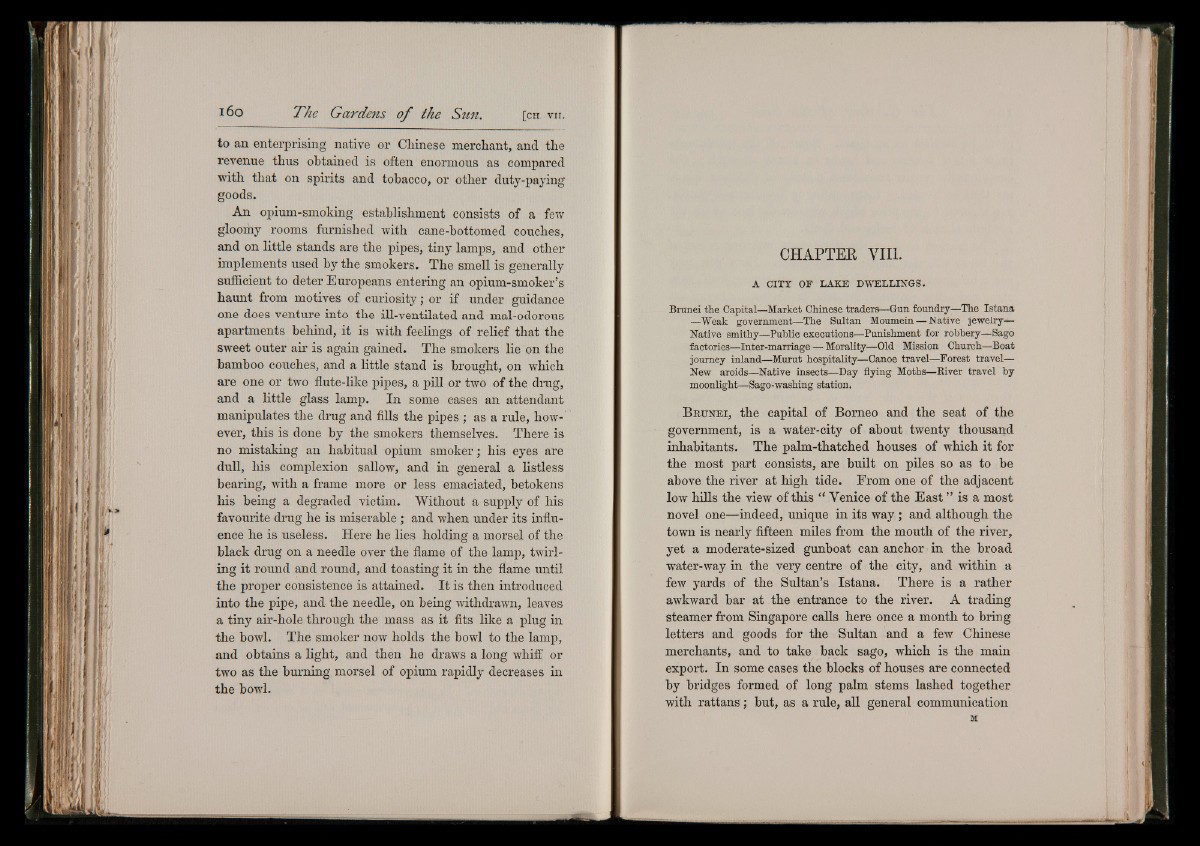
to an enterprising native or Chinese merchant, and the
revenue thus obtained is often enormous as compared
with that on spirits and tobacco, or other duty-paying
goods.
An opium-smoking establishment consists of a few
gloomy rooms furnished with cane-bottomed couches,
and on little stands are the pipes, tiny lamps, and other
implements used by the smokers. The smell is generally
sufficient to deter Europeans entering an opium-smoker’s
haunt from motives of curiosity; or if under guidance
one does venture into the ill-ventilated and mal-odorous
apartments behind, it is with feelings of relief that the
sweet outer air is again gained. The smokers lie on the
bamboo couches, and a little stand is brought, on which
are one or two flute-like pipes, a pill or two of the drug,
and a little glass lamp. In some cases an attendant
manipulates the drug and fills the pipes ; as a rule, however,
this is done by the smokers themselves. There is
no mistaking an habitual opium smoker; his eyes are
dull, his complexion sallow, and in general a listless
bearing, with a frame more or less emaciated, betokens
his being a degraded victim. Without a supply of his
favourite drug he is miserable ; and when under its influence
he is useless. Here he lies holding a morsel of the
black drug on a needle over the flame of the lamp, twirling
it round and round, and toasting it in the flame until
the proper consistence is attained. It is then introduced
into the pipe, and the needle, on being withdrawn, leaves
a tiny air-hole through the mass as it fits like a plug in
the bowl. The smoker now holds the bowl to the lamp,
and obtains a light, and then he draws a long whiff or
two as the burning morsel of opium rapidly decreases in
the bowl.
CHAPTER VIIL
A CITY OP LAKE DWELLINGS.
Brunei the Capital—Market Chinese traders—Gun foundry—The Istana
—Weak government—The Sultan Moumein — Native jewelry—
Native smithy—Public executions—Punishment for robbery—Sago
factories—Inter-marriage — Morality—Old Mission Church—Boat
journey inland—Murut hospitality—Canoe travel—Forest travel—
New aroids—Native insects—Day flying Moths—Kiver travel by
moonlight—Sago-washing station.
B r u n e i , the capital of Borneo and the seat of the
government, is a water-city of about twenty thousand
inhabitants. The palm-thatched houses of which it for
the most part consists, are built on piles so as to be
above the river at high tide. From one of the adjacent
low hills the view of this “ Venice of the East ” is a most
novel one—indeed, unique in its way ; and although the
town is nearly fifteen miles from the mouth of the river,
yet a moderate-sized gunboat can anchor in the broad
water-way in the very centre of the city, and within a
few yards of the Sultan’s Istana. There is a rather
awkward bar at the entrance to the river. A trading
steamer from Singapore calls here once a month to bring
letters and goods for the Sultan and a few Chinese
merchants, and to take back sago, which is the main
export. In some cases the blocks of houses are connected
by bridges formed of long palm stems lashed together
with rattans; but, as a rule, all general communication
M